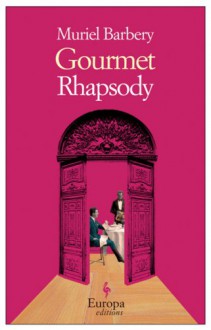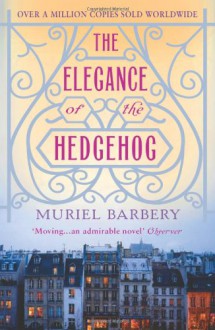
After reading Barbery’s sensational “The Elegance of the Hedgehog”, I absolutely had to get my hands on a copy of “Gourmet Rhapsody”. Yet for the longest time, and much to my despair, the only copies I could find were in large bookstores and at a big price. Earlier this week while out with a friend I ended up wandering into a used bookstore and was delighted to find a brand-new copy of the book at a decent price, instantly snatching it and running for the checkout as if I’ve just broken the law. I feel like I was meant to find this book, and if I thought Barbery’s other novel was brilliant then I simply have no words to convey how much I loved “Gourmet Rhapsody”.
“Gourmet Rhapsody” is another great example of the differences between European and American literature. Specifically, the latter still tends to focus on the minute, using them to approach bigger topics in ways that American does not, instead choosing the cut path of plot and constant straight-forward action. Barbery’s style instead allows the reader to think, to absorb all of the words she has laid out and connect them back to each other. The novel is not so much about a dying food critic as it is about using that situation to present a case of a dying man who is a rich bourgeois snob with a rather impeccable taste, a case study around which revolves an entire microcosm of people who either blatantly hate him or have a hate-but-still-love kind of relationship to him.
The alternating style of the chapters makes every chapter enjoyable for a different reason. In the chapters which focus specifically on Pierre Arthens, the reader is immersed into a tiny fragment of Arthens’ life via a specific food, in a few cases replaced by a beverage – whiskey – or a condiment – mayonnaise. The details are carefully selected to present Arthens’ character without giving the flat-out description of him. Rather, the reader can pick up all of the adjectives from the way he talks about sorbet or is cruel in talking about certain people from his past. In the second style of chapter, the reader is instead confronted with the viewpoint of people, as well as a statue (from how I interpreted it) and a cat, who talk about Arthens’, what they think of him and their relation to him. Needless to say most of them despise him, and for good reason. Some of the speakers one can guess based on the hints given about them in their chapter – a beggar, Arthens’ wife Anna, his children, etc. – while some are foggier. While some will criticize the fact that the characters weren’t developed, I’d say there was absolutely no need for them to be – that is, in the American novel’s understanding of character development, where the entire backstory and description is given. The people are characterized through their thoughts far more than they would be by their backstories, by the reader knowing that they went from stage A to B to C in their life. That would serve of no use in the novel, and Barbery doesn’t bother with such triviality. Instead, she focuses on the harmonious shift from one character to another, always relating them back to Pierre Arthens, who remains the center of the universe in the novel.
There is such a delectable, sensual intimacy in the writing that it’s impossible to justly describe in words. Reading it made me feel like I was eating something from my childhood that I loved yet hadn’t had for ages. It was a sense of comfort that one experiences only upon finding a book, and an author, who truly understands. Arthens is a terrible man, there is no doubt of that. But the book is about so much more than that. I’d perhaps parallel it to Proust’s madeleine, which is brought up in the novel at one point. Yet where the madeleine focuses only on the moment of realization that occurs in one split second, “Gourmet Rhapsody” instead is conscious of the beauty in details the entire time, the madeleine moment appearing at the very end in a slightly different kind of burst of realization. It’s a book that some will no doubt call snobby and pretentious, and this is fine and to be expected in fact, for it is written for a rather specific audience. It reminded me of why I love European literature that much more, both classical and contemporary, and gave me comfort in knowing that though I constantly feel like I don’t fit in with the North American mindset due to my European upbringing, there are still little gems throughout literature and other aspects of culture that reassure me that my way of thinking and my aesthetic are shared by someone else out there.


 Log in with Facebook
Log in with Facebook 








